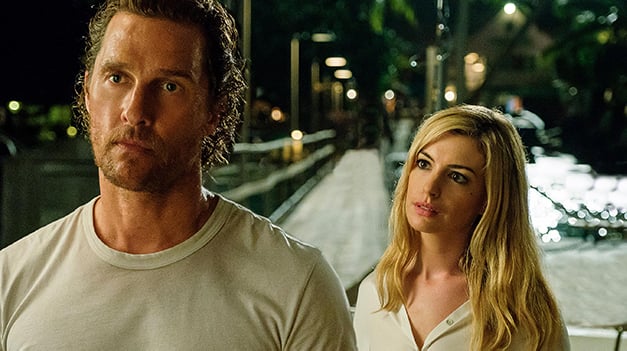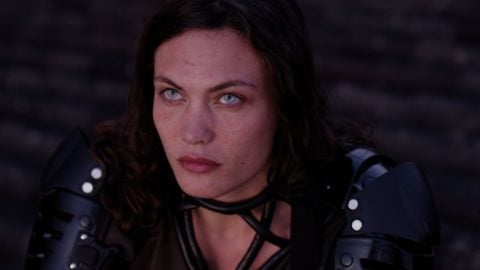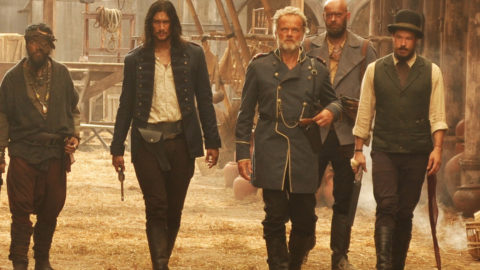Deep Focus: Serenity

A crackpot suspense film about a fishing boat captain who veers into perilous existential waters, Serenity tries to pull off a “bait-and-switch” times two. But will anyone take the bait either time? Steven Knight’s third feature as writer-director, after the self-important revenge film Redemption (2013) and the stunt-like man-in-crisis movie Locke (2014), is so flimsily and whimsically conceived that we’re left with just the sprats, flies, and chum. Knight may be the kind of messy, catalytic talent who needs to work on a sprawling canvas, with legions of collaborators. He’s done his most exciting work for longform video, as creator and principal writer of the BBC’s enthralling, iconoclastic crime-family series Peaky Blinders (2013–17).
In Serenity, Ernest Hemingway’s influence is everywhere, without the Hemingway incisiveness or eloquence. Set on a fictional tropical island called Plymouth, the movie starts out like The Middle-Aged Man and the Sea. Matthew McConaughey plays Baker Dill. (The name alone is enough to put an actor in a pickle.) This seasoned skipper could live off tourists reeling in game fish from picturesque blue seas if only he weren’t obsessed with landing a quarter-ton tuna he’s nicknamed “Justice.” His ruinous quest injures his relationship with his righteous mate Duke (Djimon Hounsou). It also puts him in debt to his warm, gorgeous mistress Constance (Diane Lane). She enjoys having her “cats” rely on her—one actual feline, plus Baker—but that dependency wounds his manly pride.
Before you can say “The Short Happy Life of Francis Macomber,” his glammed-up ex-wife Karen (Anne Hathaway), who took their son and abandoned Baker after his service in Iraq, pops up to offer $10 million if he’ll get her vile, corrupt husband Frank (Jason Clarke) drunk and toss him overboard to the sharks. (The boat is too ironically named “Serenity.”) Karen’s heart and mind tremble beneath her blonde locks and perfect makeup. She says she never stopped loving Baker, whose birth name, we learn, is John. He looks especially good compared to Frank, who gets off on hurting her. Karen plays the daddy card with her former husband: she tells him her bouts with Frank terrify their adolescent son Patrick (Rafael Sayegh). Is Patrick, probably on the autism spectrum, merely a poignant figure, or is he also an ominous presence? Only his computer knows for sure.
Neither the movie’s opening feint nor its initial twist proves seductive or electric. The real location—Mauritius, in the Indian Ocean—may be breathtaking, but the bait and tackle shop, the saloon, and the other fictional island hot spots seem hokier and more generic than necessary, even after the film’s secrets are revealed. No matter how many cane fields and colorful storefronts Knight, cinematographer Jess Hall, and production designer Andrew McAlpine thrust in our faces, their conception of an enchanted isle is at once too overbearing and too thin to bewitch an audience. To paraphrase Malcolm X, we don’t land on Plymouth Island—Plymouth Island lands on us.
Knight’s dialogue thuds, too. He tries to achieve the simplicity and terseness that make Hemingway’s language so easy to burlesque, but when Karen momentously announces to her ex, “You were right and I was wrong,” the line smacks of grade-school playgrounds, not Harry’s Bar. I prefer even the ersatz-Casablanca flavor of Knight’s script for Robert Zemeckis’s failed wartime romance Allied (2016). There at least I got some laughs from interchanges like “There’s a thing called the soul. I’ve looked into her soul.” “No, you’ve looked into her eyes.”
Knight’s final surprise accounts for the film’s peculiarities and flaws, including its blunt, repetitive imagery and hard-boiled baby talk. But that doesn’t make the experience satisfying. If anything, we feel jerked around and cheated by a concept that tosses a superb cast into limbo. The script encourages McConaughey to pour on the indiscriminate intensity he appeared to leave behind several years ago: no actor should be asked to summon more than one primal howl per picture. Lane fares better in her sexy, limited role; she seems to grow more expressive and sensually aware with each passing year. But as a glossy yet bedeviled beauty, Hathaway, who satirized chic delectably in last year’s Ocean’s 8, gets stranded on the far side of parody.
As Serenity goes on, it gets nuttier and nuttier: the Plymouth Island radio DJ directly addresses Baker/John and his moral quandaries; an incongruous metropolitan character in owlish specs and a suit keeps trying to get his attention; questions mount about the psychic connection between Baker/John and his son. The final act of this movie is as absurd as anything I’ve seen since Darren Aronofsky’s mother! (2017), though its emphasis is on father! The impressionistic rumblings heard on the soundtrack might be Papa Hemingway rotating in his grave.
Michael Sragow is a contributing editor to Film Comment and writes its Deep Focus column. He is a member of the National Society of Film Critics and the Los Angeles Film Critics Association. He also curates “The Moviegoer” at the Library of America website.





